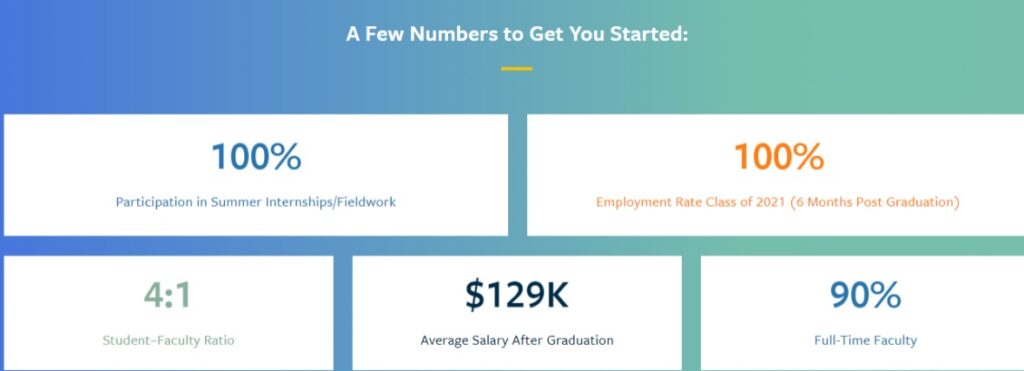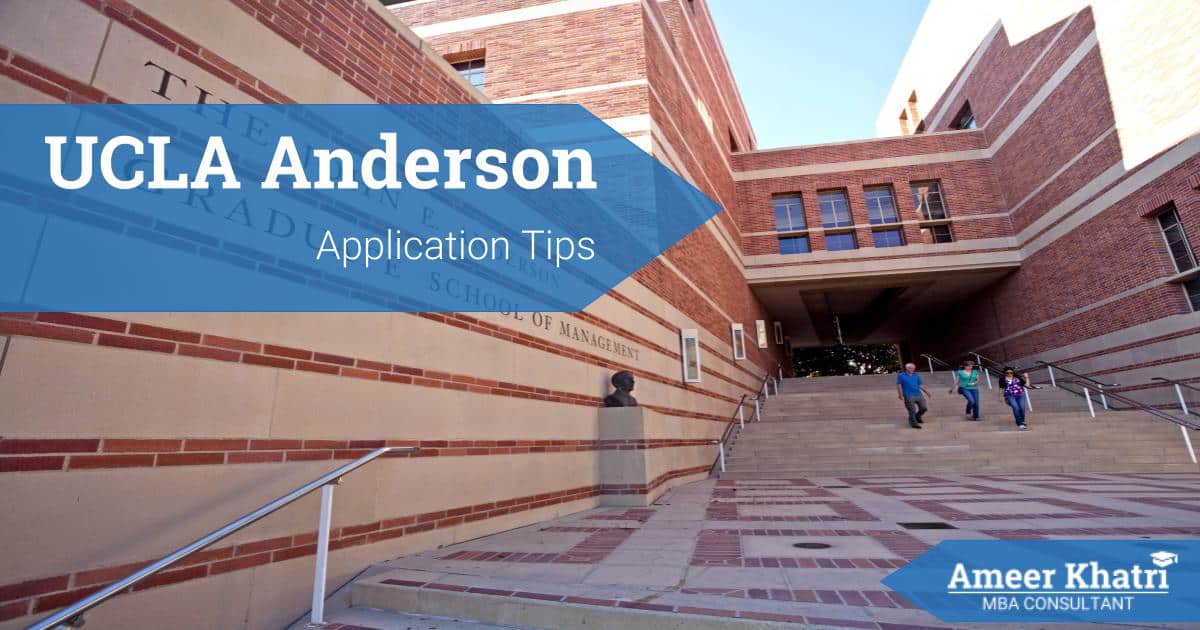Getting Started
The Master of Finance (MIF) program at UCLA Anderson is a distinctive and esteemed offering that blends cutting-edge business methodologies with a solid theoretical and philosophical foundation. While alternative MIF programs are offered at numerous colleges, UCLA Anderson stands out as one of the top business schools in the world by providing this specialized degree.
Students at UCLA Anderson take advantage of a dynamic program created to give them a thorough education in financial engineering. The course has an outstanding faculty of well-known financial professionals who offer knowledge and experience to the classroom. Students are exposed to the most recent developments in the industry and learn to apply technical and theory-based methods to real-world financial difficulties through their guidance and instruction.
The curriculum goes beyond abstract ideas and combines real-world experiences to give students practical skills and knowledge that apply to the workplace. Students participate in a summer internship as part of the program, enabling them to use what they have learned professionally and gain priceless practical knowledge. Through this internship, students will have the opportunity to network with professionals in the field and get a deeper understanding of the financial business.
The UCLA Anderson MIF program presents a unique chance to work with business partners on practical financial projects. By taking on complex problems and creating creative solutions, students receive real-world experience and support in the finance sector. This practical approach makes sure that graduates are well-equipped to succeed.
Overview
One of the notable elements of the comprehensive Career Development Series provided by the MIF Programme is the “Communicating with Impact” course. This workshop seeks to give MIF students the knowledge and abilities necessary to persuade others to agree with their technical notions and ideas because it recognizes the importance of effective communication in developing a successful career. This course focuses on improving communication strategies suited to specific situations and audiences because decision-makers must comprehend complex financial information. It emphasizes how word choice and delivery method can significantly impact a message’s effectiveness and power. The MIF Programme ensures that students understand the material and learn how to persuade the appropriate audiences of their thoughts most effectively.
The Applied Finance Project (AFP), which allows students to use their knowledge and abilities from coursework to address actual, real-world financial engineering difficulties, is a standout feature of the MIF Programme. The spring quarter marks the start of the project, while the subsequent autumn quarter marks its conclusion. This schedule gives students ample time to work with their team and a business client, encouraging in-depth investigation and analysis.
The AFP provides students with a practical and holistic introduction to quantitative finance by collaborating with prestigious business clients. The AFP’s projects concentrate on various topics, including portfolio management, risk management, hedging, the valuation of derivatives, and quantitative trading tactics. These projects are sponsored by renowned businesses, including PIMCO, Citi, PwC, Aspirant, Accenture, AXA Rosenberg, Hyundai Capital, and Research Affiliates, ensuring that students work on issues that have real-world applications. Students can extend their professional networks and obtain significant exposure to potential employers by working closely with customers.
The AFP goes beyond traditional classroom instruction by giving MIF candidates a stage to exhibit their mastery and aptitude in quantitative finance. Additionally, it encourages students to improve their communication abilities because they must persuade their team and the sponsoring organizations of their findings, techniques, and recommendations. Their capacity to collaborate, communicate their ideas persuasively, and adjust to the changing demands of the finance business are all strengthened by this practical experience.

Ranking and Reputation
The UCLA Anderson Master of Finance (MIF) program is regarded as a top-tier program in the financial sector and holds this distinction. The MIF program at UCLA Anderson, known for emphasizing computational proficiency and in-depth mathematical modeling skills, provides students with the quantitative skills required to address the complex and novel difficulties in today’s financial markets.
The program’s outstanding ranking and reputation further bolster its position as one of the finest in its industry. The UCLA Anderson MIF program is ranked a fantastic #2 in the country by the esteemed QS World University Rankings. This acknowledgment highlights the program’s dedication to excellence, demanding curriculum, and capacity to turn out outstanding alums in the finance sector.
In addition, QuantNet, a reputable resource in the quantitative finance field, has ranked the MIF program at UCLA Anderson as the nation’s #9 program. This acknowledgment highlights the program’s all-encompassing approach to financial engineering education, which combines theoretical underpinnings with practical applications and gives students a well-rounded skill set that employers highly value.
Top-tier students and business professionals worldwide are drawn to the UCLA Anderson MIF program due to its outstanding rating and reputation. Students in this program join a prestigious community of financial professionals and have access to a sizable network of alums, professors, and business connections. This network is an excellent source for job opportunities, mentorship, and teamwork, further increasing the program’s standing and the prospects for its alums.
Class Profile
The Master of Finance (MIF) class profile at UCLA Anderson is distinguished by a diverse and accomplished mix of students from different countries and backgrounds. The program’s 84 total students provide a vibrant environment that promotes teamwork and the sharing of ideas.
The MIF program emphasizes gender diversity, with 34% (26 students) female students and 66% (58 students) male students. By including different viewpoints and promoting a more welcoming academic climate, this balanced representation improves the learning experience.
The age range of MIF students ranges from 21 to 45 years, with a median age of 31. This age range creates a dynamic learning environment by encouraging interactions between students with different levels of professional experience and viewpoints.
With participation from 12 different nations, international students make up a sizeable portion of the MIF cohort. They make up 50% and 90% of the class, demonstrating the program’s international scope and fostering a diverse learning environment. International students’ varied cultural origins and viewpoints add to the learning process by fostering a deeper understanding of international finance.
The academic successes of MIF students are noteworthy and reflect their remarkable test results. The typical quantitative GMAT score is 720, or 92%, while the typical overall score is 166, or 94%. These results demonstrate the students’ strong quantitative and analytical skills, crucial in financial engineering.
The high average GPAs show that UCLA Anderson’s MIF program draws students with distinguished academic backgrounds. The average GPA for graduates is 3.75, which reflects the students’ commitment to and success in their prior academic endeavors. The intellectual rigor and accomplishment of the MIF cohort are further shown by the undergraduate GPA, which is as remarkable at 3.65.
Students in the MIF program have a range of pre-MIF industrial experiences, which they bring to the classroom along with a variety of viewpoints and skills. Engineers make up the most considerable percentage (34%), followed by those with backgrounds in finance/economics (28%), mathematics/statistics (26%), computer science (7%), and other fields (5%). This wide range of professional backgrounds helps to create a multifaceted learning environment where students can benefit from one another’s distinctive viewpoints and skill sets.
Additionally, their undergraduate and graduate majors reflect the MIF students’ varied academic backgrounds. Thirty percent of the undergraduate majors were in engineering, twenty-six percent in physics, twenty-six percent in finance and economics, nineteen percent in business, and five percent in other disciplines. 34% of students who pursued graduate studies decided to specialize in engineering, 28% in finance/economics, 26% in mathematics/statistics, 7% in computer science, and 5% in other graduate majors. This varied academic background supports the MIF program’s multidisciplinary approach and makes incorporating many viewpoints into financial engineering easier.
Curriculum
This 15-month full-time program is offered at the UCLA Anderson campus in Los Angeles and features a rigorous English curriculum. Python or R is employed for teaching the courses.
PROGRAM SCHEDULE
The year plan of the UCLA Anderson MIF program is designed to provide students with a comprehensive and balanced curriculum. The core courses in the fall and winter semesters lay the foundation of financial engineering principles. In contrast, spring and fall semesters elective courses allow students to specialize in areas of interest. The Career Development Series runs throughout the program, equipping students with essential career management skills. The summer internship provides practical industry experience, and the Applied Finance Project allows students to apply their knowledge and skills to solve real-world financial engineering problems. Overall, the program offers a well-structured and immersive learning experience, preparing students for successful careers in the finance industry. Here is the schedule of the program:
Fall Semester (September – December):
- Investments
- Financial Accounting
- Econometrics
- Stochastic Calculus
- Career Development Series
Winter Semester (January – March):
- Trading, Market Frictions, and FinTech
- Derivative Markets
- Empirical Methods in Finance
- Fixed Income Markets
- Career Development Series
Spring Semester (April – June):
- Financial Risk Management
- Computational Methods in Finance
- Special Topics in Financial Engineering (Choose 2 out of 3):
- Data Analytics and Machine Learning
- Balancing Purpose and Profit: Environmental, Social, and Governance (ESG) For Managers and Investors
- Quantitative Asset Management
Summer:
- Summer Internship
Fall Semester (September – December):
- Applied Finance Project
- Fieldwork/Research in Financial Engineering
- Special Topics in Financial Engineering (Choose 3 out of 4):
- Credit Markets
- Statistical Arbitrage
- Behavioral Finance
- Introduction to the Finance of Blockchain and Cryptocurrency
Core Courses:
- Investments: The Investments course provides a comprehensive understanding of asset pricing and portfolio choice. Students learn essential concepts such as discounted cash flow approaches and no-arbitrage framework for valuing financial securities. The course covers key paradigms in asset pricing, including the Capital Asset pricing model (CAPM), arbitrage pricing theory, and the Fama-French three-factor model. Students also delve into dynamic portfolio selection and optimization approaches.
- Financial Accounting: The Financial Accounting course introduces students to the fundamental concepts of financial accounting and their underlying assumptions. It explores the uses and limitations of financial statements, emphasizing the evaluation of business performance and risk through accounting information. The course also examines the procedural aspects of accounting and its application in research studies.
- Econometrics: Econometrics focuses on the theory and practical application of linear regression. Students explore topics such as simple linear regression, multiple regression, prediction in a multiple-regression model, residual diagnostics, and detection of outliers and violations of stochastic assumptions. The course equips students with the necessary tools to analyze and interpret data in a quantitative finance context.
- Stochastic Calculus: Stochastic Calculus covers derivatives markets’ economic, statistical, and mathematical foundations. Students gain a deep understanding of discrete-time and continuous-time paradigms used in derivatives finance. Topics include stochastic processes, differential equations, Ito’s Lemma, stochastic calculus, and the Black–Scholes no-arbitrage paradigm. The course also explores market completeness, risk-neutral valuation, and derivatives hedging strategies.
- Trading, Market Frictions, and FinTech: This course delves into the processes and mechanisms involved in price formation in securities markets. It emphasizes the crucial role of information transmission in the secondary market. Topics covered include exchange design rules, market designs, asymmetric information, liquidity provision and pricing, high-frequency trading, market crashes, and short-selling.
- Derivative Markets: Derivative Markets focuses on the organization, role, and interrelations of put and call option markets, futures and forward markets, and their application in arbitrage relations, valuation, and hedging. The course also explores implementing derivative trading strategies, using derivatives in securities markets, and recent innovations in derivatives markets.
- Empirical Methods in Finance: This course equips students with probability and statistical techniques commonly used in quantitative finance. Students learn estimation application software and gain practical experience estimating volatility, correlations, and stability.
- Fixed Income Markets: Fixed Income Markets provides a quantitative approach to fixed-income securities and bond portfolio management. Students gain insights into fixed-income security markets, including pricing, measuring and hedging interest rate risk, dynamic interest rate models, and management of fixed-income portfolio.
- Financial Risk Measurement and Management: This course explores various aspects of financial risk measurement and management, including market risk, liquidity risk, settlement risk, model risk, volatility risk, and kurtosis risk. Students learn methodologies and strategies for identifying, assessing, and managing these risks in financial contexts.
- Computational Methods in Finance: This course introduces students to the quantitative and computational tools used in finance. It covers numerical techniques such as option pricing using binomial and trinomial models, lattice algorithms for computing derivative prices and hedge ratios, simulation-based algorithms for pricing American options, and numerical solutions of partial differential equations in financial engineering.
Elective Courses:
- Data Analytics and Machine Learning: This elective course focuses on applying data science techniques for decision-making and predictive analytics in finance. Students delve into topics such as predictive and prescriptive models, panel regressions, text analysis, model validation and selection, models for discrete outcomes, and machine learning. Industry-leading Python statistical environments are used, and examples and homework assignments specifically address finance applications.
- Quantitative Asset Management: Quantitative Asset Management delves into applying advanced quantitative techniques to asset management problems. The course covers asset-pricing models in depth, portfolio optimization and construction, and dynamic strategies such as pairs trading, momentum trades, and strategies addressing behavioral finance anomalies. Students also explore various asset-management structures, including mutual funds, hedge funds, ETFs, and special investment vehicles, while examining the trading strategies employed by these organizations.
- Credit Markets: Credit Markets provide an introduction to credit modeling for financial institutions and quantitative investors. The course covers the basics of corporate debt securities and offers an in-depth exploration of credit derivatives markets. Students gain insights into structured credit products like cash and synthetic collateralized debt obligations (CDOs).
- Statistical Arbitrage: This course focuses on the study of quantitative equity market-neutral strategies. Students explore both high-capacity strategies with longer time horizons and low-capacity strategies with millisecond time horizons. The course provides students with tools to develop their own sources of alpha, employing statistical arbitrage. Students study slow and fast signals, aiming for a high Sharpe ratio and avoiding technologically intensive approaches.
- Behavioral Finance: Behavioral Finance introduces students to evidence of anomalous return behavior in stock markets and explores how quantitative firms apply this evidence to manage equity portfolios. The course investigates evidence that challenges the standard risk-return paradigm and examines psychological biases inherent in investors. Students discuss stock trading strategies to avoid and adopt, exploring the latest evidence on individual and institutional investor behavior.
- Introduction to the Finance of Blockchain and Cryptocurrency: This elective course introduces financial concepts in the cryptocurrency industry. Students learn about historical performance, valuation, regulatory concerns, and the infrastructure of the crypto market. The course also covers derivatives, centralized and decentralized financing (DeFi), staking, and asset and wealth management in the blockchain and cryptocurrency space.
Special Topics in Financial Engineering
Students can choose five out of eight special topics courses offered, with two available during the Spring term and three during the final Fall term. These courses provide an in-depth examination of problems or issues of current concern in financial engineering. The topics covered in these courses may vary, allowing students to explore emerging trends and cutting-edge research.
Career Development Series:
The Career Development Series is designed to equip MIF students with the essential skills and tools for effective career management. The series provides guidance and resources to help students identify, compete for, and secure professional opportunities in the finance industry. Topics covered may include resume and cover letter writing, interview preparation, networking strategies, job search techniques, and professional communication skills. The Career Development Series aims to enhance students’ employability and empower them to navigate their career paths successfully.
Admission Requirements
The UCLA Anderson Master of Finance (MIF) program’s admission criteria encompass a comprehensive evaluation of applicants based on various essential factors. The following are the key admission requirements considered by the admissions committee:
- Academic Proficiency: Prospective candidates must demonstrate their ability to excel in graduate-level business and finance coursework. A strong academic record is highly valued, particularly in relevant subjects such as finance, economics, mathematics, and related quantitative disciplines.
- Programming Skills: Evidence of proficiency in computational programming languages, including C++, R, and Python, is essential. Familiarity with computers as computational and management tools is also required, as technology plays a crucial role in financial engineering.
- Quantitative Background: Applicants are expected to have a solid quantitative foundation, including coursework in areas such as linear algebra, multivariate calculus, differential equations, numerical methods, and advanced statistics and probability. Topics encompassing discrete and continuous distributions, density functions, sampling theory, statistical inference, hypothesis testing, ordinary least squares, t-statistics, sampling vs. population moments, and chi-square goodness of fit tests should be covered.
- Communication Skills: Excellent English writing, speaking, and presentation abilities are essential for success in the program, as effective communication is critical in financial engineering roles.
- Mathematical Proficiency: Evidence of experience with mathematical tools, such as MATLAB, is highly regarded, as these tools are commonly used in financial engineering for modeling and analysis.
- Work or Research Experience: While not mandatory, applicants with prior work or research experience in a quantitative discipline are encouraged to highlight their accomplishments in these areas.
- CFA Certification: Progress towards obtaining the Chartered Financial Analyst (CFA) certification is recommended but optional. This certification demonstrates dedication and expertise in the field of finance and investment management.
- Statistical and Econometric Applications: Familiarity with statistical and econometric applications is recommended, as they are frequently employed in financial engineering to analyze financial data and develop models.
To ensure your successful application, please note the following important points:
- Application Fee: A non-refundable application fee of $200 is required, payable via credit card during the online application submission. Please be aware that this fee cannot be refunded, regardless of the admission outcome.
- Transcripts: Scanned copies of transcripts from all educational institutions attended must be uploaded during the online application. Original transcripts or documents are only required after receiving an admission offer. Applicants must hold at least a bachelor’s degree from a recognized accredited institution, with the degree conferred before the September program start date.
- Standardized Tests: There is no minimum GRE/GMAT requirement. The Admissions Committee considers all scores in the context of your overall academic preparation and management potential. However, TOEFL or IELTS scores are mandatory for applicants whose native language is not English or for those who attended universities where English was not the official language.
- English Language Proficiency: TOEFL test scores are valid for two years. Upon arrival at UCLA, admitted applicants must take the UCLA English as a Second Language Placement Examination (ESLPE). Depending on the ESLPE results, candidates may need to complete English as a second language course from their first term at UCLA. A score of 100 or higher on the TOEFL iBT or 7.5 or higher on the IELTS waives the ESLPE requirement.
- Letters of Recommendation: Two letters of recommendation, submitted online, are required from individuals who are well acquainted with your performance in a work or academic setting. Preferably, these should be direct professional or academic supervisors.
- Work Experience: While work or research experience in a quantitative discipline is recommended, it is not mandatory for admission. We encourage exceptional undergraduates with solid quantitative backgrounds to apply.
- Essays: Applicants must submit two essays as part of the online application to the MIF program. Additionally, there is an option to provide one optional essay, which can supply additional information to help us evaluate your potential to succeed in the MIF program. These application essays serve as an opportunity for the Admissions Committee to get to know you as an individual and assess your ability to write concisely and effectively.
Please keep in mind that admitted students typically possess an average of three years of full-time work experience before joining the MIF program. We are excited to review your application and learn more about your qualifications and potential to contribute to our dynamic MIF community.
Program Costs and Financial Aid
Studying at UCLA Anderson offers a prestigious education and a pathway to a rewarding career in financial engineering. However, it’s essential to be aware of the costs and fees associated with the program.
- Application Fee: To initiate your application process, a non-refundable application fee of $200 is required. This fee covers administrative costs and is payable by credit card during the online application submission.
- Admission Enrollment Deposit: Upon receiving an offer of admission, candidates must submit a non-refundable enrollment deposit of $2,000. This deposit secures your spot in the MIF program and demonstrates your commitment to joining the class.
- MIF Program Fees: The total program charges for the Fall 2023 entering class are $89,539. It’s important to note that program charges are subject to annual adjustments. The breakdown of fees for each academic term is as follows:
- Fall 2023: $22,384.75
- Winter 2024: $22,384.75
- Spring 2024: $22,384.75
- Fall 2024: $22,384.75 (Fall 2024 fees are estimated and subject to change)
- Health Insurance: Health insurance coverage is mandatory for all students. The cost of health insurance during the MIF program is approximately $1,857.11 per term, totaling $7,428.44 for the entire program.
- UCLA Student Fees: In addition to program charges, UCLA student fees cover various campus services and resources. These fees differ for each academic term and are as follows:
- Fall 2023: $730.48
- Winter 2024: $649.48
- Spring 2024: $649.48
- Fall 2024: TBD (fees for Fall 2024 will be determined by the university)
Considering these costs, the total expenses for the MIF program during the academic year 2023-2024 are approximately $98,996.88.
It is important to be mindful that program charges may vary each year, so future students should anticipate potential adjustments for subsequent academic years.
Financial aid options, scholarships, and other resources may be available for students admitted to the MIF program to help manage the costs. Prospective students are encouraged to explore financial aid opportunities and plan accordingly to ensure a smooth and successful financial experience at UCLA Anderson.
While the cost of studying at UCLA Anderson represents a significant investment, its invaluable education and opportunities make it a compelling choice for aspiring financial engineers aiming for a fulfilling and prosperous career in the field.
At UCLA Anderson, merit-based scholarships of varying amounts are awarded to MIF admits based on the overall strength of their admissions application and its relative strength within the pool of admitted candidates. The admissions committee conducts a holistic review, considering the applicant’s academic achievements, work experience, and other important factors to identify deserving recipients for these scholarships.
Candidates do not need to submit an additional application for scholarship consideration, as all completed applications are automatically evaluated for potential awards. The scholarships may be granted during admission or at any point during the admissions cycle, reflecting the institution’s commitment to recognizing and supporting exceptional students.
Applicants are encouraged to explore resources such as the Graduate and Postdoctoral Extramural Support (GRAPES) website and Non-UCLA scholarship resources for further opportunities. Additionally, California residents can be eligible for a $10,000 fellowship known as the California Resident Fellowship. This specific fellowship is exclusively available to California residents offered admission to the UCLA Anderson MIF program. Candidates meeting the residency criteria, including U.S. citizens and permanent residents who have lived in California for more than one year, can be considered for this fellowship by answering relevant questions in the MIF application.
Campus and Location
UCLA Anderson prioritizes the health and well-being of its graduate students, ensuring they have access to a range of resources and support. Located on the vibrant campus of UCLA, students have the advantage of being part of a world-renowned institution with a wealth of facilities and services.
To help students navigate the campus and get acquainted with the graduate student experience, the UCLA Graduate Division offers in-person campus tours. These tours provide valuable insights into campus life, graduate student support, and available resources. Virtual tours are also available for those unable to visit in person, allowing students to explore UCLA’s campus and graduate housing virtually.
The Office for Students with Disabilities (OSD) provides academic support services for students with documented permanent or temporary disabilities. The OSD offers services tailored to individual student needs, including campus orientation, accessibility support, note-takers, sign language interpreters, test-taking arrangements, transportation assistance, support groups, and more. All services are confidential, and no fees are associated with accessing these resources.
The Disabilities and Computing Program (DCP) at UCLA provides information access and adaptive technology training, support, and services for students, faculty, and staff with disabilities. The DCP offers web accessibility evaluations, adaptive technology recommendations, and various assistive technologies such as voice synthesis, Braille print, large print, and voice recognition technologies to ensure equal access to information.
UCLA Anderson is committed to maintaining a safe and inclusive student environment. The Sexual Harassment Prevention Office provides information about campus policies and procedures related to sexual harassment. Individual consultations can be arranged for those seeking detailed information and guidance on resolving concerns. Workshops and briefings are also available to educate and raise awareness among students, faculty, and staff.
Recap of Key Points
- Education: Applicants must possess a Bachelor’s degree.
- Work Experience: A minimum of 3 years of full-time work experience is required,
- GMAT/GRE: Good scores in the GMAT/GRE are mandatory for full-time applicants.
- TOEFL/IELTS: Valid TOEFL or IELTS scores are required if the medium of instruction is not entirely in English.
- Campus Location: UCLA Anderson MIF is in Los Angeles, a global business hub focusing on innovation and entrepreneurship.
- Regional Benefits: The program offers advantages such as exposure to diverse cultures and unique business practices in Europe and Asia, excellent connectivity, and a robust regional network.
- Resources Available: UCLA Anderson MIF provides resources like extracurricular activities, co-curricular activities tracking, m sports facilities, publications, funds and scholarships, and support for student leaders.
- Program Costs: Tuition fees for the UCLA Anderson MIF program amount to $89,539. 9:Financial Aid: UCLA Anderson offers grants and merit-based scholarships for exceptional candidates. Applicants can also explore other funding options to support their MIF journey.
- Reminder: Visit the official website for detailed and updated information on the UCLA Anderson MIF program, including admission requirements, financial aid options, and any recent changes.
Call to action or next steps for interested readers
Suppose you found this blog post on the UCLA Anderson MIF program insightful and are considering pursuing an MBA at UCLA Anderson. In that case, I encourage you to stay tuned for our upcoming write-up on “How to Get into the UCLA Anderson MIF Program.” This blog will delve into crafting a robust application, including writing compelling essays, securing solid letters of recommendation, and presenting yourself effectively during interviews. We will also cover essential deadlines and offer valuable tips to enhance your chances of admission.
Whether you’re a prospective full-time or part-time student, this upcoming blog will serve as a valuable resource to navigate the application process successfully. It will equip you with the knowledge and insights to present your skills, experiences, and aspirations in the best possible light.
Getting into the UCLA Anderson MIF program is an exciting journey, and we are here to support you every step of the way. Stay tuned for our comprehensive guide on “How to Get into the UCLA Anderson MIF Program” and take the first step towards realizing your academic and career goals.
Remember, preparation and a thorough understanding of the application process can make a significant difference. We look forward to helping you navigate the path to your dream MBA program at UCLA Anderson





